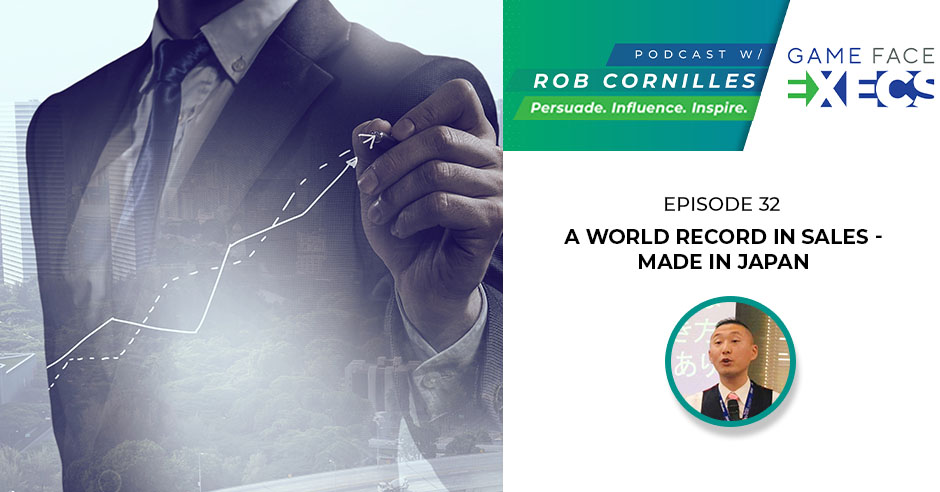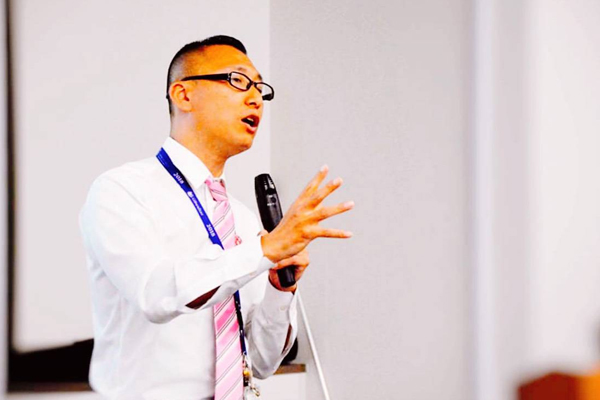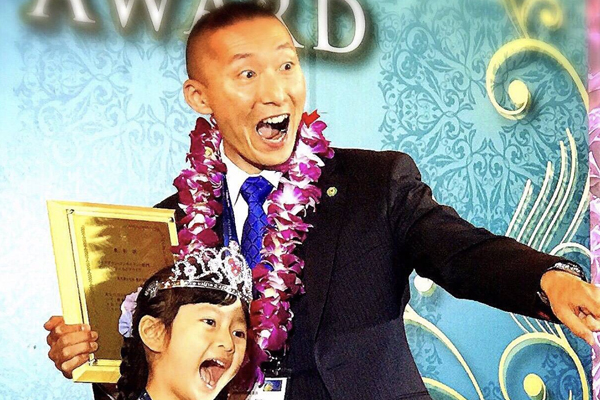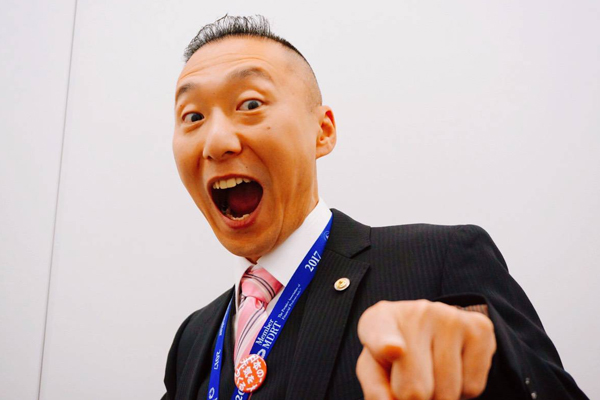
Tetsuya Minami changed his goal from obtaining two contracts a week to two contracts a day. As a result, he earned a world record for sales with his record-shattering insurance business. In this episode, Tetsuya talks with Rob Cornilles about how his aim in life insurance is to protect futures. Tetsuya wants to save as many people as possible. He believes it is his love for his people that gave him success. Join in the conversation to learn more about how Tetsuya, a former octopus restaurant owner, achieved record-breaking success.
—
Watch the episode here:
Tetsuya Minami | A World Record In Sales – Made In Japan
How A Former Octopus Restaurant Owner Turned His Love For People Into A Record-Shattering Insurance Business
This show is so pleased to take our audience overseas to meet our guest, someone who has made a name for himself in the Guinness World Book of Records. It’s my pleasure to introduce to you Tetsuya Minami from Tokyo, Japan. Thank you for being with us. It’s such a pleasure to have you and to know your story, which we could all learn about. Let’s begin with that story. We would love to know the specifics. How does someone end up in the Guinness World Book of Records in Sales?
First of all, I’m happy to be able to be on the Guinness Record for the Gibraltar Financial group. There are three important parts: for what, who and why do I do what I do? For what and for who would I do the things for the people around me? How can I make their life better and by thinking that I think there is success?
[bctt tweet=”By thinking about how you can make life better for those around you, you’re on your way to success. ” via=”no”]
When you set a world record for sales, did you know at that time that it was happening? Was that a goal of yours or did someone bring your attention to it after the fact?
I wasn’t thinking about the world record. I was thinking about doing my best for my clients and then we got it.
What were the actual numbers that qualified you for that distinction? I recognize that you focused on your clients and that was your focus and your charge. In the record book, what does it tell us about the record you set? What numbers are we talking about?
In The Gibraltar Life Insurance Company, we have a saying called, “Two a week,” but basically what it is, they said, “If you can get two contracts a week, you’re doing great.” I changed that to two a day, meaning get two contracts a day. I focused on getting that goal for the whole year. We have 365 days and I have two contracts a day, and the record is 732.5 signed contracts.
That is an amazing number. Congratulations, Minami-san. You said you worked very diligently. You worked very hard. That’s obviously unquestioned. There had to be something else inside of you that wanted to work that hard, to have that kind of success, to obtain that many clients. Where does that drive come from? Your success obviously is unquestionable and yet it had to take something more than just hard work because a lot of people work hard. What do you think really drove you to change the company’s expectation from two a week to two a day? Why would you want to do such a thing?
Our job as life insurance sales is we protect people’s futures. I wanted to save as many people as possible and that’s what made this goal.
While you were working at this pace, what did your supervisor or your boss have to say about your work? Were they telling you to slow down? Were they telling you to speed up or were they just leaving you alone?
Before I got into insurance, I owned a Takoyaki shop. We had a lot of customers who are happy. When I said I was going to close the shop, we had a lot of people who were sad for us. I had a warm feeling. If I was going to quit this Takoyaki store, I wanted to help more people through insurance. I was telling that vision to my supervisors as well and we were like a group. We said, “Let’s do it, let’s go have more.” They never said to slow down. They were on my team and we worked together for the goal.
You had over 760 accounts in one year, but you also had a half account. Can you explain what that means?
We have something called the joint. When someone asks you to come together, come along, and partner up to sell. If you sell together, then the contract becomes half. That’s how we got a 0.5 in there.
It’s teamwork. In America, if you are number one in a sales department, your colleagues either love you or despise you. They’re jealous. Sometimes they don’t want you to be that successful. Did you find that to be the case in your office or is the Japanese business culture different than in America?
There were some people who were jealous obviously, but the number was outrageous. It was unachievable. A lot of people were like, “I can’t do that but good for you. I’m cheering you on.”
I have lived in Japan. I used to speak Japanese fluently, but I’m not fluent anymore. There’s a word in Japanese, ganbatte, which has a very unique meaning to the Japanese people, the culture, and the language. Could you please explain in your words what ganbatte means especially when you’re working hard to accomplish a goal?

World Record: You need to proactively take leadership and proactively add energy.
The word, ganbatte, obviously you can say that to people. It’s easy to say, but I think it’s also a word that you say to yourself. It’s something that says, “I can do it.” After you say it to yourself, “I can do it,” that’s when you get to say to people, “You can do it as well.” The word ganbatte is something to motivate yourself and people who are motivated and people who are working towards their goals are the ones who can say ganbatte to others as well.
When you were working with colleagues who were not having anywhere near your success and they were perhaps getting depressed or discouraged and they were seeing you having this record–setting pace of success, what could you say to them that would still encourage them to ganbatte, to keep working hard?
It’s important that you start from yourself. At these moments, you need to be proactively taking leadership and adding energy. For example, in Japan, we have a culture of saying, “Ittekimasu,” when we‘re leaving the house, the office or wherever. People would say, “Ittekimasu,” but I would say, “Genki ittekimasu,” which means, I will go with energy. When people hear ittekimasu, they will usually say itterrashai. After I did this for a while, some people started saying, “Genki ni itterrashai,” meaning, go with energy. Some people started to copy me and said, “Genki ni ittekimasu.” Your influence spreads to others, it starts with you. You have to do your own thing and when people are struggling, you say, “Look at me, I’m doing my best. I’m working hard. You can do it.”
As you know in the United States, in North America, I train sales teams. I train them for sports teams and train them within corporations and small businesses. One of the principles that I teach is, to be successful, we must act successful and that means that customers and clients want to be around success. They don’t want to be around people that they perceive to be failing. Do you believe that principle is true? Were some of your clients buying from you because they knew that you were successful and that’s all they needed to know about you?
I understand that people like to be around successful people and obviously, success accelerates more success. It generates more success. There are three important parts in succeeding. First, you should believe that you can succeed. Second, when something bad happens, something negative happens, you change that to a plus. Change the negative into a strength or a positive. The third part is to have a set goal in mind and work towards that goal every day, little by little. You do this not for yourself. You do this for people. It’s not for me, but it’s for you. If you can do this for people and work diligently little by little every day, those people are the people who will succeed.
[bctt tweet=”Success accelerates more success. ” via=”no”]
That’s a sales game-changing piece of advice. Thank you very much for that. There’s some great insight there. I have to ask you, there had to be some days when, as we say in English, you weren’t feeling it. It wasn’t happening for you. How did you get out of those doldrums as we say? How did you lift yourself up or was every day for one year was perfect?
Obviously, there were hard days that you’re just not feeling it. The longer you live, the more negatives there’s going to be, but I can change the negatives into positive for myself. I do this every day. That’s why for me, I rarely have an off day. What I do is, first, at night, I ask myself, “What kind of learnings that I learned today? What kind of things did I learn today?” Second is, “How would I apply that to my life in the future?” Third is, “By when would I have applied that and made it something or have a shape for it in some way?” I do this feedback session with myself every day before I sleep. If you feel like you have to do this, it’s very hard. I love to drink sake every night. I connect this with something that I love to do, drinking every night. I connect it with the feedback. I do it together as a set and that’s how I am able to do it every day. I drink, do a feedback session with myself and go to bed every night.
That‘s a fascinating technique and a suggestion we can all learn from. I’m not much of a sake drinker, but I do appreciate the approach that you take. With all the distractions that each of us has in our jobs every day with the internet, our phones, email and things on television, how do you stay focused? Isn’t it more difficult now for professionals to stay focused on the job at hand? If that’s true for you, what kind of discipline did you have to use in order to put aside those things that would distract you and even friends and family that might distract you from your goal? How did you always stay focused?
A lot of people say their distractions are that they go home and watch TV and they just binge–watch, but for me, I don’t watch any TV. When I go home, I have the time to read books, to do feedback sessions. I have a goal. I have a weekly, monthly and yearly goal. I do the math backward and if it doesn’t fit, it doesn’t fit in my schedule. For example, let’s say you have a goal to lose 10 kilos, which is around 23 pounds in a year. For that to happen, you need to lose 0.833 kilograms a month. If my schedule says that I won’t be able to lose 0.833 kilograms in a month, then that thing that’s going to stop me from doing that is not going to make it into my schedule.
There are patterns to how people act. We have three kinds of patterns. One is the things you want to do. Two is the things you can do and three is the things you have to do. People who can’t achieve goals are people who are not successful, usually prioritize these as things I want to do, things that I can do, and the things I have to do. People who are successful do the other way around. They start with things that I have to do, things I can do and things I want to do.
How they do these things that they want to do is, they create time for the things they want to do and this is the mindset that I have. I start with the things that I have to do. For me to be able to do this, if that’s going to distract me and not going to make me do what I have to do, then it’s not going to make my schedule. I believe I have that mindset and that’s how I was able to maintain and stay away from distractions.

World Record: Have a feedback session with yourself every day before you sleep.
Thank you for that explanation. Let me ask you generally, is there a point in someone’s life or in their career when they’ve set a goal, but they have to recognize at some that it’s not going to be achieved? Maybe they’re in the wrong profession. Maybe they shouldn’t be in sales or maybe they shouldn’t be in school or they ought to be doing something different and they had a dream, but they’re coming to the recognition that maybe they had to set their sights on something else. Is that a fair conclusion that people should come to at times in their life or is anything possible?
Let’s say, as he did with his hands, you start here and then you’re going to Point B and that’s your goal. A lot of people think that it’s a straight line. You go from Point A to Point B with a straight line, but the reality is that we’re human beings, whatever we do is not going to go as planned. It’s not always going to be good. We’ll have bumps. We’ll go up and down. At the down moment, if you think that you won’t be able to do it, the possibility of you achieving your goal will decrease. If someone can just go past a certain point and keep working through it at a certain point, their results will dramatically improve. The key is to be able to believe that even through the hard times you can do it. If you keep working hard, if you can keep believing that you can do it and you strongly desire your success, those people would work towards success.
I must ask you, are your mother and your father proud of you?
I believe that they are proud of me.
As I recall, your father started a factory and your mother worked in a barbershop. What did you learn from your parents as you were growing up about developing this type of mindset and this type of work ethic?
I learned a great deal from both of my parents. My father taught me that you only live once, you only have one life, and success is not being rich or it’s not being famous, it’s doing what you want to do until however many years you are. That’s why it’s important to ask yourself and live by asking yourself, “Why am I doing this? Who am I doing this for?” When I was an owner of a Takoyaki restaurant, my mother worked at a barbershop. She taught me that selling Takoyaki is not your job. Your job is to make the customers who come happy.
If you can go to whatever barbershop and everyone pretty much have similar skills, there’ll be some differences, but they can do pretty much similar things. The important thing as a barber is not to be able to cut hair well. It’s to provide that environment where people say, “I come here because I want to see you, or I come here because I want to be in the same environment as you.” That’s what my mom has taught me. I’m absolutely sure that I learned a great deal of these mindsets from my parents.
[bctt tweet=”The key is to be able to believe that even through the hard times, you can do it. ” via=”no”]
Someday, will you introduce me to your parents?
Yes, absolutely.
You talked about the Takoyaki shop that you started. For the audience that doesn’t understand what Takoyaki is in Japanese, can you please explain that to us?
Takoyaki is a Japanese soul food, from little kids to grandparents. If they have a small craving for food, you can eat it in one bite. We have a food called Okonomiyaki, which is great as well. Takoyaki, the great part of it is that you can enjoy the whole food, the whole flavor in one bite. It’s not something that you have to sit down and eat. You can walk and eat. As Japan has grown its economy, these foods started to rise where you can casually eat. Takoyaki is a food that can give you some relaxation and the feeling of safety in your heart.
You didn’t tell us what’s in Takoyaki but I know, I‘m not going to tell my readers. I want them to try it next time they go to Japan. You mentioned Okonomiyaki. I learned how to make an Okonomiyaki in Hiroshima. I like to treat my family to Okonomiyaki anytime we can. It’s probably not very good to you but we think it’s delicious when I make it.
That’s great.
You’ve been an owner of a Takoyaki shop. You’re a chef. You make something that the Japanese people love, a food that is a comfort food to them. Also, in your collegiate days, you were in cheer. You spent at least a couple of years, as I recall, being on the cheer team, which is a huge responsibility within the Japanese University. It’s not a position that they take lightly. There’s a lot of responsibility associated with that position. Those two jobs or roles that you’ve had, how do you think that prepared you for being so successful in sales?
I worked part–time for four years after I graduated high school to gather tuition fees for college. I went to university when I was 22 to 26 years old. After I graduated from university, I hitchhiked around Japan. Within five years, I decided I wanted to start my own restaurant. I did work at other restaurants and saved 98.9% of the money I made. I drank something called kinako. It’s some powder that you mix with milk. I saved around $100,000. I started a Takoyaki shop in a place called Koenji. I owned and ran it for nine years.
To think of why I wanted to do this, why I started doing this is in high school, I wasn’t able to go to the high school that I wanted to go to. That was the first time where I realized that I couldn’t live the story that I wrote. From that, in college, I decided I’m going to try something that I want to do even if it might be hard. That’s how I decided to go into cheerleading. When I went in, I first thought, “You can’t receive money. You can’t receive any trophies. How can people cheer people on for no motivation?”
We wear this black suit kind of clothing. We cheer people on, but then I realized that we weren’t able to cheer because of us. There were brass bands that were cheering whenever someone hit a base, or there were fans that were cheering on. That’s when I realized that we were able to cheer because other people were helping us cheer on. Through cheerleading, I realize that you have to start it. We initiated the cheerleading, even though we received a lot of help from others. That’s what I learned.
Another thing I learned is that if someone does something good for you, pass it on. If someone tells you something nice, pass it on to another person. If people keep doing that, that might come back to you. That’s where I learned that you should start it. With cheerleading, we start cheering, and everyone follows us. That’s where I learned that we have to initiate by ourselves. That translated into the Takoyaki store. In the Takoyaki store, I realized what I was doing was correct and I was able to translate that into sales.
Even though you and I speak different languages, the meaning of what you’re saying resonates with me. It’s a universal language. The principles that you’re teaching us about being a self-starter, having that can-do spirit, working hard. Anyone who’s reading this, regardless of their position, especially my younger audience members, I hope that they’re getting from you that it doesn’t matter where you start. There are things that you can learn in every position and every role that you play. There is no job that’s insignificant. Every job is a place where you can learn important principles and life lessons that will translate to the next job or the next position that you might explore. Minami-san, what is your favorite baseball team in Japan?

World Record: Success is not about being rich or being famous. It’s doing what you want to do for the rest of your life.
Rather than watching pro baseball, I watch more college baseball, so I don’t have a favorite team in the pros. Rather than actually watching baseball, I go to see the cheerleading teams. The reason why I go watch them is because I see them shouting with all their hearts, with all they got and then I get a flashback of what I did. I said, “I did that as well.” I then compare myself and say, “Am I working as hard now? Am I doing my best now as well?” It’s a good reminder to keep working hard so that’s why I always go a few times to the baseball games to watch the cheerleading team.
Next time I’m in Japan, we have to go to a college baseball game together. Afterward, you can make me some of your famous Takoyaki and I will make you my famous okonomiyaki. I look forward to visiting with you again. This has been an enjoyable interview. I thank you for all of your experiences that you share with us and all of your wisdom.
I thank you so much for a great time as well. I hope that some of my experiences will translate into people’s courage and help them move forward. My life goal is to become happy. For that, I need to be with people who I love, eat great things and be successful in work. My purpose for my work is to make people happy. I was able to share a lot of experiences and I hope that it can help people become happy.
Thank you.
